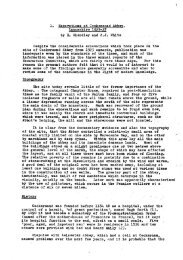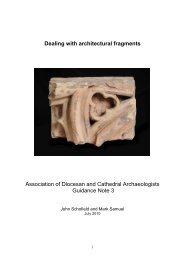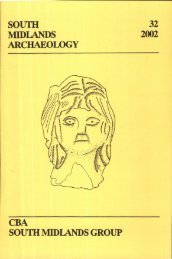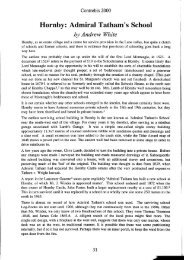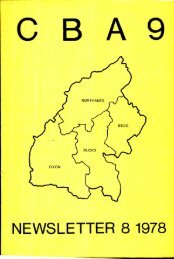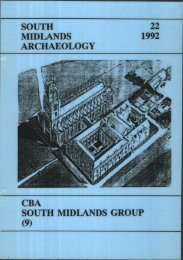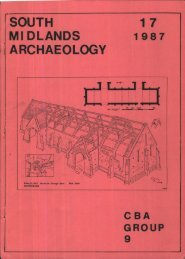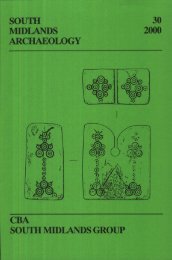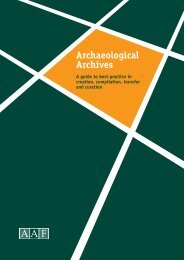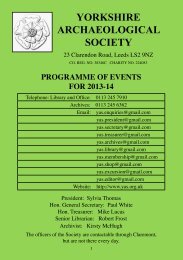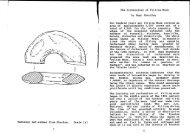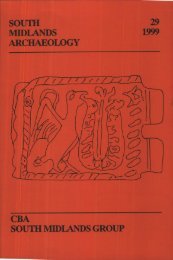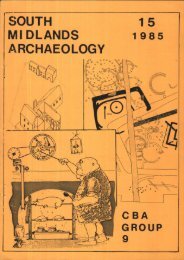Untitled - Council for British Archaeology
Untitled - Council for British Archaeology
Untitled - Council for British Archaeology
Create successful ePaper yourself
Turn your PDF publications into a flip-book with our unique Google optimized e-Paper software.
4<br />
by the full report, with specialiSt appendices,<br />
of the Late IA, RB, AS site at Upton Nervet,<br />
excavated in-1961-3. This is not a site of<br />
outstanding significance and careful excavation<br />
yielded uncertain results. One wonders<br />
first at the time lag, and whether the BAC<br />
will ever, under present conditions, be able<br />
to come up to 'date and, secondly, at the<br />
interest of the majority of readers in the<br />
detail given. Is it necessary, <strong>for</strong> instance,<br />
to devote a whole page (59) to a bone report<br />
which says all in the first sentence - "The<br />
small amount of material, involved does not<br />
Allow assumptionito be made..."? The rest of<br />
the page is occupied by such items. as: "E.<br />
Trench, layer 5: cattle? fragment of a large<br />
long bone" on two lines. It is no criticism<br />
of the-author, who excavated meticulously and<br />
prepared the report over years, in the<br />
days be<strong>for</strong>e we were aware of an archaeological<br />
crisis, to suggest that such.datailed publication<br />
in such a journal is out of place today.<br />
Beyond that, one .wonders how long subscribers<br />
in general will be content with a traditional<br />
journal in which, <strong>for</strong> one reader at least,<br />
only 8 pages on a C19 Reading ironworks really<br />
brought the past to lile.' And how many new -<br />
subscribers will be attracted by such presentation?<br />
-The DoE Report, prepared by a Working Party<br />
of the Ancient Monuments Board Committee <strong>for</strong><br />
Rescue Archaeolo-gy under. Professor Frere, restates<br />
the responsibility of an excavator to<br />
publish and to conserve the significant material<br />
and records and, in the present publication<br />
crisis, eaused,not least by soaring costs,<br />
goes on to exRmine principles and to suggest<br />
the basis <strong>for</strong> an overall policy. This is<br />
primarily <strong>for</strong> the DoE and concern3. rescue<br />
archaeology, but it is offered "as a guide <strong>for</strong><br />
directors of excavations and excavating and<br />
publishing bodies" (p.1) and the Working Party<br />
considers that "the distinction sometimes<br />
drawn between rescue and research excavation<br />
has become unreal" (p.9).<br />
Four.levels of record are distinguished, of<br />
which Level III, full illustration and<br />
description, with finds lists and drawings and<br />
specialist analyses, has been the normal aim<br />
of publication. This could well become an<br />
economic impossibility and the recommendation<br />
is that Level IV, synthesised descriptions<br />
with only supporting data should be the<br />
objective in future, provided that essential<br />
conditions are fulfilled, namely chat all the<br />
original material is readily accessible in an<br />
archive and' that Level III data not generally<br />
published should be available on request in a<br />
limited circulation. (p.3).<br />
This is not the place to discuss the means<br />
suggested to achieve these conditions, but<br />
other relevant points noted are that publication<br />
should be as speedy as possible, that<br />
publication of evidence alone is not enough<br />
(p.3) and that interim reports "serve obviously<br />
valuable purposes" (p.4). This last<br />
is one of the main justifications of this<br />
Newsletter.<br />
Another of the reasons noted <strong>for</strong> the<br />
publication crisis is that "more excavation<br />
is being done without a corresponding increase<br />
in the media of publication" (p.1).<br />
There is there<strong>for</strong>e all the more reason <strong>for</strong><br />
making existing publications more effective.<br />
It is hoped that editors and editorial committees<br />
of our long established journals will<br />
heed the suggestions of the Frere Report,<br />
which the DoE has circulated widely, particularly<br />
the value of "good, firm editing", and<br />
early guidance' to contributors, in effecting<br />
economies. Otherwise "there is danger that<br />
very shortly availability of these traditional<br />
and established publication media will become<br />
restricted because of sheer inability<br />
of the national and local societies to support<br />
the balance of the cost (after DoE grant)<br />
through membership subscriptions and voluntary<br />
editorial services." (p.7)<br />
One dislikes crying "Wolf" and repeating<br />
the word "crisis",,but the danger iS real.<br />
RECENT APPOINTMENTS -<br />
BERKSHIRE -<br />
Miss Susan Read - Assistant Archaeologist,<br />
Reading Museum; Roger Kent - Conservation<br />
Officer, Reading Museum; Grenville Astill -<br />
Direetor, Berkshire Archaeological Unit;<br />
Julian Richards - Field Survey Officer, Berk.-<br />
shire Archaeological Unit; Noel Green.- Honorary<br />
Administrator, Berkshire Archaeological<br />
Unit.<br />
MILTON KEYNES,- Bradwell Abbey Field Centre<br />
Bob Zeepvat<br />
OXFORuSHIRE -<br />
Don Benson left Ox<strong>for</strong>d Department of Museum<br />
Services to become Director of the Dyfed<br />
Archaeological Trust; Mrs. Kirsty Rodwell<br />
has left the Ox<strong>for</strong>dshire Archaeological Unit.



